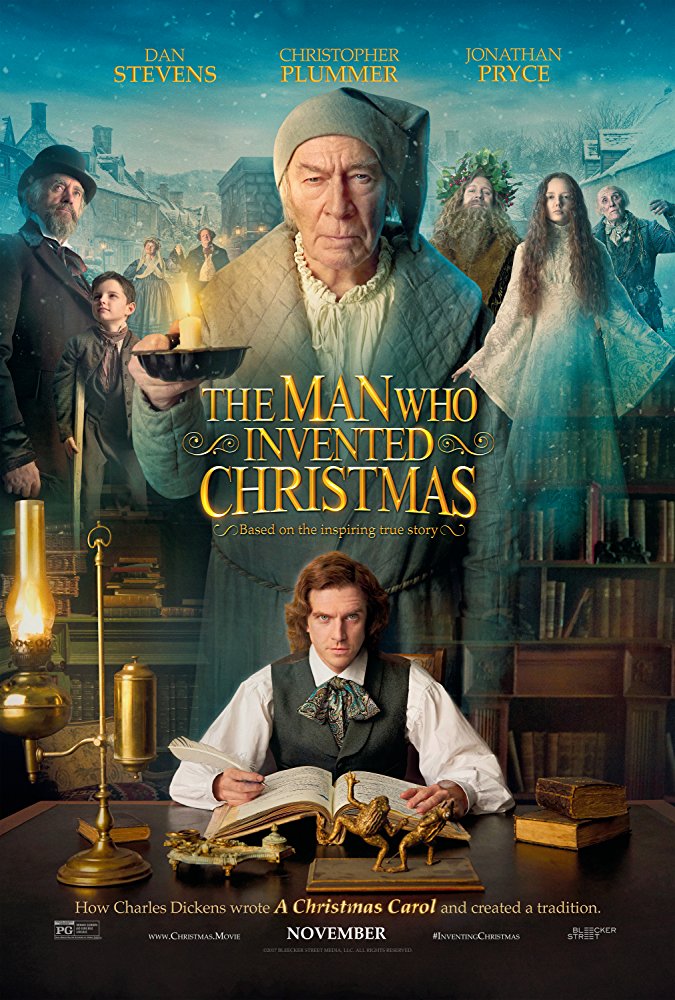 Back in January, my family took me to see The Man Who Invented Christmas at the cheap theater. I highly recommend this excellent movie. It was released last November and then unceremoniously booted from many theaters by The Last Jedi (which, let’s face it, was quite disappointing and really not worth kicking other movies out). As I watched the movie, I was struck by how it was both an excellent portrayal of book history and a great insight into the writing process. Specifically, it made me ponder this question: When should writers listen to the advice of those around them?
Back in January, my family took me to see The Man Who Invented Christmas at the cheap theater. I highly recommend this excellent movie. It was released last November and then unceremoniously booted from many theaters by The Last Jedi (which, let’s face it, was quite disappointing and really not worth kicking other movies out). As I watched the movie, I was struck by how it was both an excellent portrayal of book history and a great insight into the writing process. Specifically, it made me ponder this question: When should writers listen to the advice of those around them?
History of Dickens
The Man Who Invented Christmas compellingly dramatizes Charles Dickens’ experience writing and publishing A Christmas Carol in the amazingly short time of six weeks in the winter of 1843. At the lowest point of his early career, Dickens was greatly in need of producing a new novel that would boost both his own self confidence as a writer and his bank account.
The movie portrays two primary influences for his Carol. The first was a desire to rebuild in people the spirit of Christmas. Christmas at that time had sunk to the level of second-rate holiday. His goal for the book was to revive the season of good cheer. The second influence was his subconscious need to confront his traumatic childhood. After his family was thrown in debtor’s prison due to his father’s inability to manage money, twelve-year-old Charles spent a miserable time living alone and working in a grimy, depressing bootblack factory. In order to accomplish his goal of celebrating Christmas, Dickens needed to believe that people can change. Out of those two influences grew one of the most enduring works of Western literature.
And if he’d listened to his publishers, it might not have happened at all.
To Listen or Not To Listen
Dickens’ last few novels had been flops. His publishers, Chapman and Hall, were not too keen on risking more money on a rushed novel based on a minor holiday. (Though they are minorly mollified when he tells them it will be a comedy.) But Dickens was convinced his idea was a great one, so he furnished his own money to produce the novel. If he had listened to the advice of Chapman and Hall, he might never have written the work that revitalized both his career and the Christmas season. This just goes to show that publishers (and editors) don’t know everything!
But, on the other hand, the movie also portrays an excellent example of an author needing to listen to advice about his writing. As the fictional Dickens works on his draft, he’s convinced that Tiny Tim has to die, that people aren’t capable of change. This links back to his strained relationship with his father, who is continually in debt and still misusing Dickens’ own resources. Dickens doesn’t believe his father can change, so he doesn’t think Scrooge can change in order to save Tiny Tim’s life. Tiny Tim must die. But everyone he tells the story to, from his maid to his editor/agent/friend Forster tells him: Tiny Tim can’t die!
“You’re the one who told me to kill little Nell,” Dickens says to Forster.
“This is different,” Forster replies.
And indeed it was different. Can you imagine a Christmas Carol in which Tiny Tim had died? In which Scrooge didn’t see the error of his ways and change his whole outlook on life? That would have been a Christmas Carol which completely missed its mark.
Be True to Your Theme
Sometimes, authors need to have faith in their own writing, in their own grand ideas. But sometimes, they need to be willing to kill (or not kill, as it were) their darlings to make their story shine.
And how do you know the difference? When do you listen to your rejection letters or beta group or editor, and when do you put all their well-meaning advice aside and stick to your guns? There is no one clear answer to these questions. Each situation is unique, and as writers grow, they gain the ability to discern which advice is useful and which is not. But what Dickens teaches us in this situation is that you need to find the advice that rings true to what you are trying to accomplish. Be true to your theme.
Both in saying no to his publishers and yes to his editor and beta readers, Dickens remained faithful to his original theme: reviving the Christmas spirit. By writing a captivating story in which we are all asked to confront our own miserliness, a story in which Tiny Tim lives and Scrooge proves that even the meanest of us can change, Dickens transformed the world. And so can you.
P.S. I’ve recently finished reading the book on which the movie was based, and found it to be accessible, entertaining, and educational. An excellent popular example of book history!

